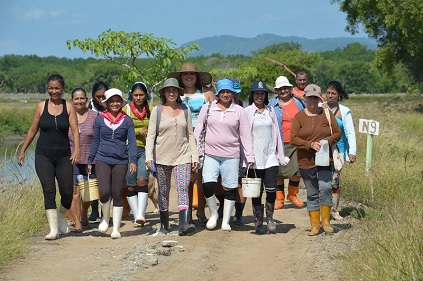Costa Rica promotes the development of sustainable small-scale fisheries
July 9th, San José. Costa Rica drafted a bill to guarantee the development of the artisanal fishing sector and to benefit the local coastal communities, according to The State of the World Fisheries and Aquaculture 2018 (SOFIA), a publication of the United Nations Food and Agriculture Organization (FAO).
The new report published today highlights the country’s commitment to recognize the contribution of small-scale fisheries to guarantee food and nutrition security and reduce poverty.
The Costa Rican Institute of Fisheries and Aquaculture (INCOPESCA), with the technical support of FAO, participated in the consultation process of the main actors of the fishing sector, academia, nongovernmental organizations and legislators. This was with the purpose of knowing the main needs and requirements of the sector, which was the basis of the proposal of the legislative framework for the sector.
The draft general law for the sustainability of the artisanal fishing sector, in the context of food security, poverty eradication and shared governance, file No. 20.750, highlights the role of women in fisheries and promotes the importance of preserving local traditional knowledge.
 Mollusc gatherers ©FAO Costa Rica |
The SOFIA highlights the country’s example by adapting the Voluntary Guidelines for the Securing Sustainable Small-Scale Fisheries (SSF) in the legal and regulatory framework, by incorporating the situation experienced by Costa Rican fisherwomen and fishermen.
“FAO, through the guidelines, supports and recognizes the important contribution to small-scale fisheries to the equitable development of coastal communities, improve their economic situation and protect livelihoods,” commented Octavio Ramirez, FAO Resident Coordinator in Costa Rica.
The guidelines represent the first international instrument, which addresses the principles and guidelines for the development of artisanal fisheries, which were approved by the FAO Committee on Fisheries in 2014.
The guidelines also promote responsible fishing, sustainable social and economic development for the benefit of present and future generation. In addition, they promote a human rights-based approach.
Likewise, they validate the importance of the fishing productive sector, under the axes of responsible fishing, governance of tenure in fisheries, promotion of decent work, access to new markets for fishers, gender equality and plans to cope with climate change.
From the project Sustainable Management of Bycatch in Latin America and Caribbean Trawl Fisheries (REBYC-II LAC), the implementation and dissemination of the Voluntary Guidelines through capacities in fishing communities is promoted.
